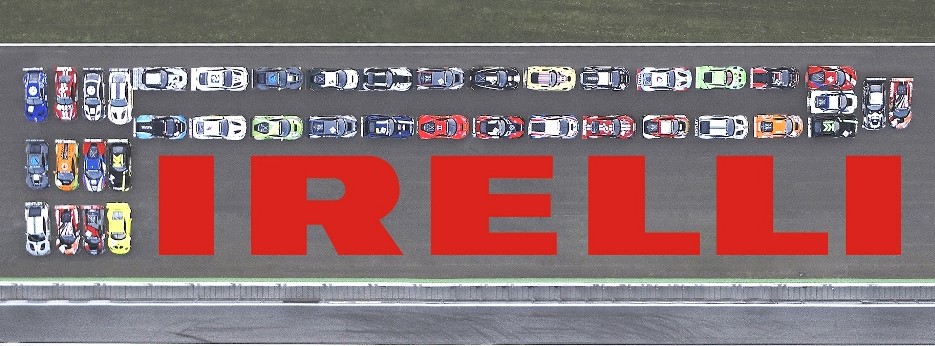WHEELS . . .
PIRELLI RECREATES ITS WORLD-FAMOUS LOGO USING MORE THAN 40 GT3 CARS AT MONZA 
At Monza, 41 cars, 12 prestige manufacturers, over 150 people and 22,000 horsepower all combined to recreate a historic portrayal of the Pirelli logo from 1978: 80 meters long and 18 meters tall. As was the case 40 years ago, the modern cars participating in this Pirelli logo recreation were diverse, featuring different makes, models, engines, architectures and styles – yet all with the same Pirelli tires. The iconic 1978 Pirelli logo was recreated by the GT3 cars that currently compete in the Blancpain GT Series: the world’s premier championship dedicated to road car-based racing machines, exclusively equipped by Pirelli. A total of 41 cars made up the Pirelli logo at Monza; as soon as the sun began to set after a busy day on the track. The cars all gathered on the main straight for the photo shoot, where they normally reach 174mph. This time, they were pushed into place one by one, with the only sound coming from the P Zero tires on the hallowed asphalt. The original 1978 concept was to involve a huge variety of different road cars from a mix of manufacturers, to illustrate that the one thing they had in common was their Pirelli tires. Photographer Adrian Hamilton directed the photo shoot, and there was also a TV ad produced by Italian director Giulio Cingoli, introducing the slogan: “Tires with a capital P”. This was also the very first TV ad that also spawned a ‘making of’ spin-off. Fast forward 40 years later to 2018 at the legendary Monza circuit: one of the oldest permanent tracks still in regular use, second only to Indianapolis. And once again, thanks to a collaboration with championship organizer SRO, another giant Pirelli logo was formed by cars on the asphalt. However, rather than road-going models from 1978, these were cutting-edge GT3 cars that compete in the Blancpain championship. This has more manufacturers represented than any other motorsport series, including Aston Martin, Audi, Bentley, BMW, Ferrari, Lamborghini, Lexus, McLaren, Mercedes-AMG, Nissan, Porsche and Jaguar. Each company was present within the Pirelli logo formed on the main straight, as they all represent a part of the prestige world in which Pirelli is the market leader. Many of these car companies use Pirelli tires exclusively, which are specifically homologated to enhance the individual dynamics of each car and maximize safety. P Zero is the ultimate expression of Pirelli’s ‘perfect fit’ strategy, ever since the tire was first seen in 1987, when the Ferrari F40 made its debut on bespoke Pirelli tires. And right from the very beginning, the links between P Zero and motorsport were clear: the first Pirelli tire to carry this exalted name was actually the one that equipped the mighty Lancia Delta S4 in rallying. These days, the P Zero tire brand – in different specifications – is seen on sports saloons as well as road-going GT cars and competition machines, not to mention hypercars and in Formula 1. This is a long success story that has been appropriately celebrated at Monza, the ‘temple of speed’. And one that is set to continue for another 40 years.
____________________________________________ 
To qualify for 2018 Top Safety Pick, a vehicle must earn good ratings in the driver-side small overlap front, moderate overlap front, side, roof strength and head restraint tests. It also must earn an advanced or superior rating for front crash prevention and an acceptable or good headlight rating. To qualify for 2018 Top Safety Pick+, a vehicle must earn good ratings in the driver-side small overlap front, moderate overlap front, side, roof strength and head restraint tests, as well as an acceptable or good rating in the passenger-side small overlap front test. It also must earn an advanced or superior rating for front crash prevention and a good headlight rating. Vehicles with optional front crash prevention qualify for either award only when equipped with the technology. Models that earn Top Safety Pick+ or Top Safety Pick are the best vehicle choices for safety within size categories. Size and weight influence occupant protection in serious crashes. Larger, heavier vehicles generally afford more protection than smaller, lighter ones. Thus, a small car that's a Top Safety Pick+ or Top Safety Pick doesn't necessarily afford more protection than a bigger car that doesn't earn the award.
|





